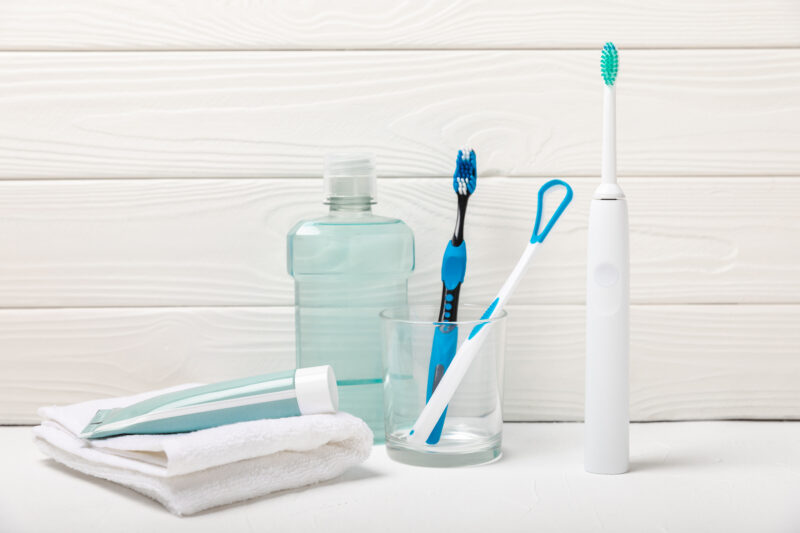Mouthwash is a common product found in many bathroom cabinets, but how many people know when exactly they should be using it? Should you use mouthwash before or after brushing? Should you swish morning or night?
Should You Use Mouthwash?
When using the right type and at the right time, mouthwash is good for you and has many oral health benefits.
The primary benefit of mouthwash is its ability to reach where toothbrushes and floss might not. It swirls around your entire mouth, targeting residual bacteria and helping to reduce their harmful impact. This reduction in bacterial load can lead to a decrease in plaque formation, a key contributor to tooth decay and gum disease.
Another benefit of mouthwash is that it can be a handy for those looking to maintain an extra level of oral cleanliness. It can help to dislodge food particles and debris from your teeth and gums, giving you a more thorough clean. This is particularly useful for individuals with braces or other dental appliances with hard-to-reach areas.
Certain types of mouthwashes may even be formulated with specific ingredients to address particular oral health issues. Fluoride mouthwashes, for instance, can help strengthen tooth enamel and prevent decay, while others offer antiseptic qualities that can help in treating and preventing gum disease.
Should You Use Mouthwash Before or After Brushing?
So, we know that there are benefits to using mouthwash, but does it matter if you use it before or after brushing? Ultimately, it is up to personal preference if you want to use mouthwash before or after brushing, unless there are specific instructions provided by the mouthwash manufacturer, or your dentist, as formulations and intended uses can vary.
Mouthwash After Brushing
The most common practice is to use mouthwash after brushing and flossing. By swishing after brushing, it can help remove any lingering particles and lay down an extra protective layer, whether it’s fluoride or another beneficial ingredient. It also helps the smell of breath by giving a last hint of freshness.
Mouthwash Before Brushing
On the other hand, some people use mouthwash before brushing, and that is because mouthwash can loosen plaque and food remnants, rendering them more easily brushed away. This pre-brushing rinse can set the stage for a more thorough clean, much like priming a canvas before painting.
When Is The Best Time To Use Mouthwash?
For optimal oral health, here are specific instances when reaching for that bottle of mouthwash can be particularly advantageous:
- Alongside your dental routine: Incorporating mouthwash into your daily oral hygiene routine, morning and night, can boost your defence against plaque, gingivitis, and tooth decay, providing a comprehensive clean that brushing and flossing alone might miss.
- After eating: Swishing with mouthwash after meals, especially lunch when you might not have the opportunity to brush, can help dislodge food particles, neutralise odours, and leave your mouth feeling fresh.
- Before bed: Using mouthwash right before bedtime can reduce the bacterial load in your mouth overnight, providing additional protection against plaque and cavities while you sleep.
- When in a pinch for bad breath: For those moments when you need an immediate remedy for bad breath, mouthwash can offer a quick fix, giving you an instant boost in confidence during social situations or professional encounters.
Whether it’s part of your everyday morning and evening routines, a midday refresh, or a last-minute breath freshener, mouthwash is a versatile oral health tool.
For Further Oral Health Advice
If you have any further questions about how to use mouthwash, or if you’re looking for personalised oral hygiene advice, don’t hesitate to reach out to us. Contact Dentistry on Coolum today to schedule your appointment. We’re here not just to treat, but to educate and empower you in your journey towards a healthier, brighter smile. At Dentistry on Coolum, your smile is our passion, and we’re dedicated to ensuring that every aspect of your oral care contributes to your overall well-being.


